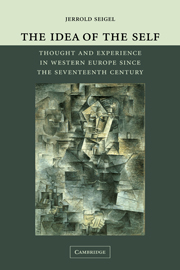Book contents
- Frontmatter
- Contents
- Acknowledgments
- PART I INTRODUCTORY
- PART II BRITISH MODERNITY
- PART III SOCIETY AND SELF-KNOWLEDGE: FRANCE FROM OLD REGIME TO RESTORATION
- PART IV THE WORLD AND THE SELF IN GERMAN IDEALISM
- 9 Autonomy, limitation, and the purposiveness of nature: Kant
- 10 Homology and Bildung: Herder, Humboldt, and Goethe
- 11 The ego and the world: Fichte, Novalis, and Schelling
- 12 Universal selfhood: Hegel
- PART V MODERN VISIONS AND ILLUSIONS
- Notes
- Index
9 - Autonomy, limitation, and the purposiveness of nature: Kant
Published online by Cambridge University Press: 05 June 2012
- Frontmatter
- Contents
- Acknowledgments
- PART I INTRODUCTORY
- PART II BRITISH MODERNITY
- PART III SOCIETY AND SELF-KNOWLEDGE: FRANCE FROM OLD REGIME TO RESTORATION
- PART IV THE WORLD AND THE SELF IN GERMAN IDEALISM
- 9 Autonomy, limitation, and the purposiveness of nature: Kant
- 10 Homology and Bildung: Herder, Humboldt, and Goethe
- 11 The ego and the world: Fichte, Novalis, and Schelling
- 12 Universal selfhood: Hegel
- PART V MODERN VISIONS AND ILLUSIONS
- Notes
- Index
Summary
No body of thinkers has made a greater impact on contemporary debates about the self than the Germans who constituted and contested the tradition of Idealism that emerged in the eighteenth century. Although the figures who mounted the most radical challenges to modern notions of selfhood and subjectivity beginning in the 1960s were French, they drew heavily on German roots. Nietzsche and Heidegger, with Schopenhauer and Marx in the background, were the chief sources of the questioning of Western individuality by Foucault and Derrida that still resonates in many places today. Both were unmistakably German thinkers, nearly unimaginable inside any other cultural tradition, and each recognized that he had a particular relationship to the philosopher who founded German Idealism in its modern form, Immanuel Kant. What was it about Germany and its philosophers and writers that gave it this status?
The first answer to this question is that Germany enjoyed a special and conflicted relationship to the Enlightenment as it was exemplified in Britain and France. British and French writers were widely and intensely read in Germany, and Kant was especially influenced first by Smith's teacher Francis Hutcheson, by Hume, and, most powerfully, by Rousseau (whom he certainly saw as a representative of the lumières). Kant was a great Aufklärer, a champion of reason and humanity, and he saw the Enlightenment as a defining moment in human development, the casting off of what he called humanity's “self-caused immaturity.”
- Type
- Chapter
- Information
- The Idea of the SelfThought and Experience in Western Europe since the Seventeenth Century, pp. 295 - 331Publisher: Cambridge University PressPrint publication year: 2005

